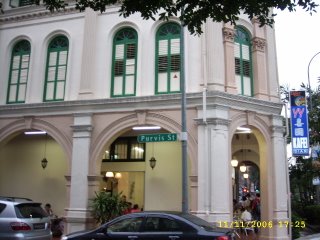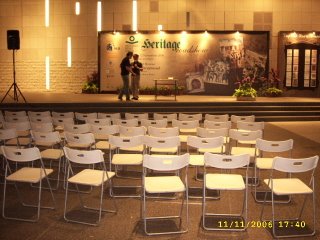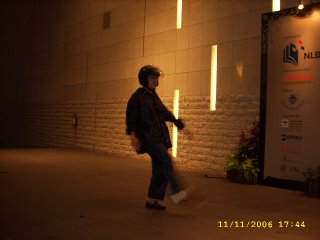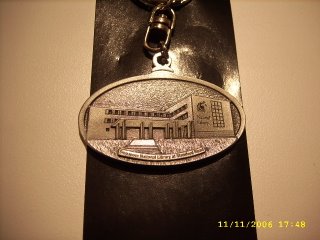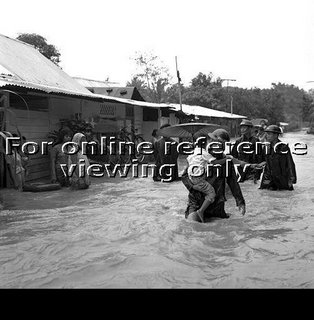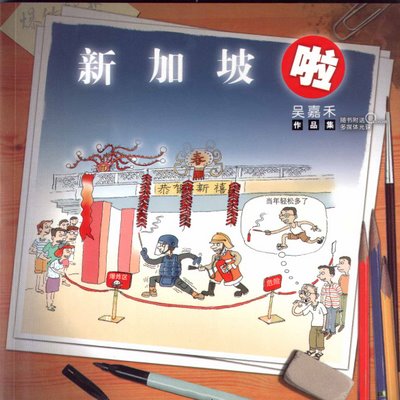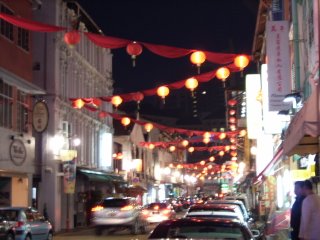
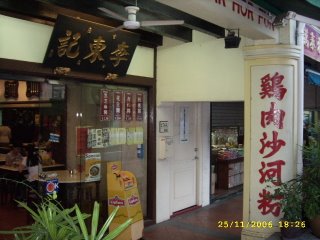
The eatery is famous for its sar hor fun.) Its prices are quite reasonable. A simple meal for the 4 of us costs less than $50, an amount which even a kiam siap (stingy) civil servant could afford. What's more, there's no "plus-plus" (service and GST charges). However, that amount does not include desserts or drinks.
After a very satisfying meal, we decided to have dessert at a very famous dessert shop nearby. Since we only heard of the shop before but had no idea where it was located, we asked some shopowners. The first one we asked actually pointed us in a wrong direction. While we went astray, we ran into this famous grilled sausages stall set up by Mr Erich Sollbock, an Austrian who was one of the 40 honourees of the Spirit Of Enterprise Awards in 2005.

We also visited the Chinatown Heritage Centre where we bought two old games:

The above photo shows the chatek which I paid $2.50 for. I used to make my own chatek for free. After my mother slaughtered a chicken (in the olden days before bird flu, this practice was common), I salvaged a few long wing feathers for making my own chatek. Of course, I left the colour of the feathers as au naturel, i.e. brown. I used to be able to kick the chatek more than 100 times at one go when I was a kid. Now, I am lucky if I can manage 5.

The above photo shows the $3.00 see sek (4-colour) cards which I used to see adults play when I was a kid. Up till now, I still don't know how the game is played.
After a short walk, there was still no sign of the dessert shop which we were looking for so I asked a second shopowner. He directed me to the shop just round the corner:

In our opinion, the desserts were not that fantastic but were passable. After my family had their desserts, they were unanimous that it was my just desserts to walk all the way back to Sago Street where the car was parked and drive it to Temple Street to pick them up. I had no choice but to oblige. Whilst taking a short cut via a backlane, I found out that food and childhood games were not all that Chinatown had to offer:
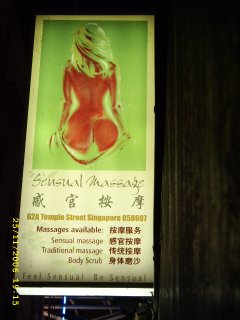

Too bad that the children missed an opportunity for an early lesson about the bird and the bees. (I have blogged about a 'not so traditional shop' in Chinatown before.) I conclude this post with a quote from an article in Today dated 27 Nov 2006, written by Mr William Lim, a 74 years old architect and thinker:
"Chinatown for example is culturally dead, it's a theme park and tourist trap today. The tourist board has had a hand in cleaning it up, and that's the point - you want the genuine chaos and excitement, not the tourist catering stores."Chinatown has been cleaned up? Far from it. In my opinion, it is getting as sleazy as Joo Chiat, if not more. And these sleazy businesses may not be 'tourist catering stores'.


 Chun See then described his blogging experiences, the comments he received and the overseas blogo-friends he made. Through blogging, he got to know the children of the ex-British servicemen who were stationed in Singapore in the 1950s - 1960s. (Click
Chun See then described his blogging experiences, the comments he received and the overseas blogo-friends he made. Through blogging, he got to know the children of the ex-British servicemen who were stationed in Singapore in the 1950s - 1960s. (Click 




